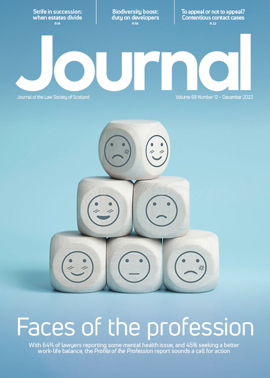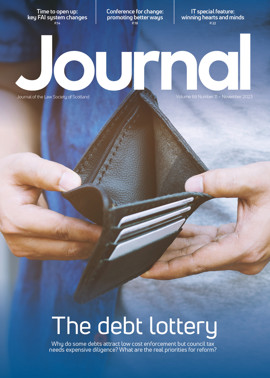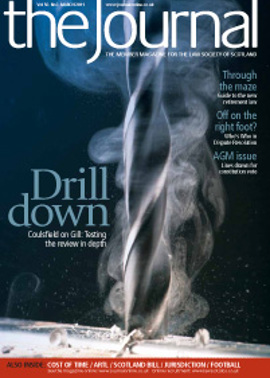The diehards

A solicitor who is also one of the longest serving directors of a Scottish professional football club is retiring after 30 years with his club.
The invitation to meet up with St Mirren’s Allan Marshall prompted the Journal to take a wider survey of solicitors who currently support our senior clubs in this way. Our starting lineup is not exhaustive (mention should also be made, for example, of Kilmarnock chairman Michael Johnston, Dunfermline director Frank McConnell, and Chris Stewart of Digby Brown, who recently joined the Saints’ board as Marshall prepares to leave), but still reflects the profession’s interest in the fortunes of clubs large and small around the country.
In club colours they think of themselves as fans first and lawyers second, in most cases being lifelong supporters who often found themselves drawn in after providing some professional or business advice (probably free).
For Marshall (who saw his first game in 1952), the process happened quite suddenly, as a result of a shareholders’ rebellion in 1981. Maclay Murray & Spens partner Amanda Jones at Hibernian – you see, this isn’t just a lads’ feature – had advised the club for about 10 years before being nominated four years ago – not without dropping some hints that she fancied being involved.
Her firm partner Alison Bryce, who joined the Greenock Morton board six months ago, first knew chairman Douglas Rae through “character building” summer jobs that her father pressed her to take in the local Buchanan’s toffee factory, which Rae owns. Inverness Caledonian Thistle’s Ian MacDonald (the odd one out here, as a rugby man – he played for Highland) was proposed for the board in 1998 by a client who was the major shareholder; he left again in 2005 but remains company secretary.
Allan Cowan, who left the Partick Thistle board last September after nearly 13 years, four as chairman, had a different track, having shown his credentials by helping start and then chairing the late 1990s “Save the Jags” campaign at a time of financial crisis for the club. Despite such commitment, Cowan is also a relative latecomer: originally from Ayrshire, he started going to games when his young son took an interest and the team’s Firhill ground was handy.
Not many can also claim to have been a player in their own right, but Aberdeen’s Gordon Buchan (no relation, he concedes, to former internationalist Martin, though his father was a Dons reserve team player) pulled on his boots part time for Arbroath while at university, and later played in the Highland League. And it was a former teammate at the Gayfield club, Ian Donald, who was to call him out of the blue, years later as Aberdeen chairman, to invite him on to the board.
Part of the game
Those who have been in post for longer, such as Marshall and Buchan (who has 20 years’ service), speak to the change in role over the last couple of decades. “There weren’t the same backroom staff then”, says Marshall. “I would spend a couple of hours a day at the ground taking care of admin matters.” Player registrations, for example, and all types of commercial contracts, that the bigger clubs at least have a professional staff to take care of now. The hospitality side of club business has almost all grown up in that time.
Allan Cowan says of his time as chairman: “You’d be likely to have the manager on the phone at almost any time, on Sunday nights or interrupting other important work you were trying to do at the office, maybe complaining about something the groundsman had done.”
All our respondents refer to the standard fare of board meetings and company business, but have found themselves taking on a real variety of legal work. Ian MacDonald mentions not only liquor licensing but betting and marriage licences. He and Buchan were at one stage on opposite sides of a ground sharing arrangement when Aberdeen hosted Caley Thistle. Pittodrie has also been hired out for rock concerts and rugby internationals; and Buchan is currently hopeful that a new stadium development, the second such proposal during his tenure, will get the go-ahead. He also cites three major share issues, the first of which took Aberdeen from private to public company status.
For Marshall, by far the major achievement of his time has been St Mirren’s relocation to a brand new stadium, a project that took about five years’ work from initial plans to final entry. Not only that, the club succeeded in paying off its debts through the sale of the old ground to Tesco, which even took on the building of the replacement as part of the deal.
“It was a big a wrench to leave Love Street”, says Marshall. “It was our home for more than 100 years. But when I went back to the old ground after we moved I realised the state it was in – there were so many things that you could never have properly put right. At New St Mirren Park we never suffered burst pipes even this winter, and it has underground heating, is low-maintenance, and offers first-class hospitality facilities.”
More mundanely, Marshall has also had his share of the sort of football court cases that make the papers – players up on drink driving charges and the like, the details of which, wisely, he keeps to himself. There was also the time he made a flying trip to London between duty shifts at Paisley Sheriff Court, for protracted but (on that occasion) fruitless negotiations for the sale of Frank McAvennie.
And sometimes things become litigious even between clubs. Allan Cowan and Ian MacDonald were on opposite sides when Partick were relegated from the Scottish Premier League, and Inverness promoted despite not having in place by the official deadline a ground of the stipulated capacity – a rule that Partick had complied with at considerable cost just a couple of years earlier. Their attempt to get a Court of Session interdict against the SPL admitting Inverness failed when Lord Brodie ruled that they should attempt other courses of action.
Cowan sees the case as marking a trend for the legal profession to take a bigger part in football, with lawyers rather than club directors frequently appearing to argue a case before the league authorities – not always successfully, he adds.
All fans together
It seems common, when a team’s fortunes take a dip, for the fans to start rounding on the board for failing to spend on better players, manager or whatever. But our panel claim on the whole to have an understanding relationship with the supporters, though Cowan says he makes a point of never looking at fan websites: “Much of the content is defamatory and the best plan is just to ignore them. If people contact me direct, I’ll explain our position.”
Marshall is typical: “They relate well to someone who is St Mirren through and through. There must be times when they feel that the board could do better, but they realise that we’re all doing the best we can.” According to Inverness’s MacDonald, “the main complaints are generally limited to the quality of the pies!” At Morton, Bryce believes the fans are understanding of the economic situation, especially for a First Division club in an area of industrial decline, and “the limits on what we can hope to achieve”.
Even at the two bigger clubs, each of which has had to claw back from a precarious league position this season, our directors claim not to suffer unduly. “The chairman has the highest profile and takes most of any flak that’s going”, says Aberdeen’s Buchan. Jones agrees, adding that her gender helps her go incognito among the Hibs supporters – though a director at another club did once assume her to be the then team captain’s wife!
Certainly no one will admit to wishing they’d become a referee instead.
Buchan puts the matter in a nutshell when he comments: “Of course I’m a supporter myself and react the same way as they do to results.” And if you ask our panel what have been the personal highlights and low spots over the years, they relate without exception to team triumphs and disasters – the cup wins (or exits), the promotions and relegations.
For Marshall, St Mirren’s cup win in 1987 was immediately followed by a tournament in Singapore which the club also won. “Just a fantastic period”, he says. “We were well complimented on our style of play and the conduct of our players out there.” Similarly for Jones, Hibs’ CIS Cup win in 2007 was “one of the best days of my life – watching the video still makes the hairs stand up on the back of my neck”. We shall spare all our interviewees the recounting of the horror stories at the other end of the scale, but it all makes Allan Cowan’s comment “At the end of the day it’s only a game!” the least believable one we heard.
One other thing Cowan does mention as bringing particular pleasure was the welcoming ceremonies for hopeful youngsters signing up for the club; even more so when the pick of the bunch made it into the first team.
For those who grew up in football-supporting families, available life tends to revolve around the game anyway. It is Ian MacDonald who admits to being “not always popular at home”, given the time needed to travel to Inverness away fixtures. In contrast, the evening of Valentine’s Day saw Jones and her Newcastle-supporting husband (at her request, she admits) settle down to watch Fulham v Chelsea.
And when Marshall finally steps down, how will life change? “I hope to spend a bit more time in my holiday home. But I’ll be following the games online and on Sky Sports.”
In this issue
- The case for full disclosure of laboratory case files
- Why join the Scottish Family Law Association?
- Above board
- Time to be counted
- Taking out rejections
- Updating the constitution
- Every bit helps
- Retiring the default age
- Keeping a grip on cash
- Watch this space
- The diehards
- Win-win ways
- "Virtual fair" opens for career options
- Law reform update
- Society's in-house work under scrutiny
- Watching over the constitution
- All aboard life's U-bend
- Ask Ash
- Working to advantage
- Frauds and scams beware
- Lay help... official
- Lacuna manufacturing
- This time it's NOT personal
- Fairness and trust
- Pensions: redefining value
- Sharing the spoils
- World IP Day 2011 approaches
- Life v reputation
- Book reviews
- ARTL, by degrees
- Contaminated land - the story continues






